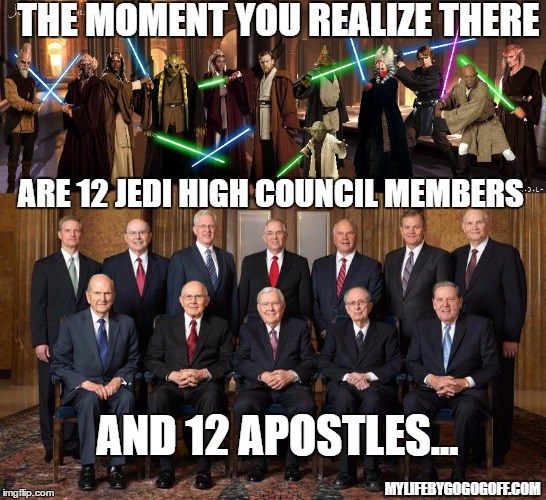
“Our callings don’t define us.” This quote from a sincere LDS Stake President keeps running through my brain. I have no doubt that he believes this claim and that he genuinely appreciates the people in the Stake. I don’t think he sees himself as above others. But his position literally places him at the front of every congregation he visits and everyone defers to his authority. His calling does define him; even if it’s not supposed to define him.
For the changing of male leaders to happen in the ward recently, for example, the entire Stake Presidency attended, along with a High Councilman, filling up the leadership row in the chapel. Their status was on full display. When they released the current leadership, they purposefully emphasized how a man once a Bishop would always be honored with the title of Bishop.
But their callings don’t define them.
They then called the new Bishop and his status in the ward immediately and noticeably changed. He is now a Bishop and will have authority and esteem where ever he goes for the remainder of his life. In fact, he was invited to a woman’s activity soon after, where a room filled with females stopped their activity to listen to the Bishop offer the final, definitive words about motherhood. No female leaders were invited to speak.
But his calling doesn’t define him.
I can’t help but contrast this with the release of Relief Society or Primary Presidencies. While I sometimes hear Elder’s Quorum presidents honored with “President” long after release, the same respect is not given to female leaders. More telling, we don’t have special titles, long thank-yous, or huge tributes when Sunday School, Young Women, or Primary teachers are released.
But their callings don’t define them.
I once listened to two former elders laugh at a former female missionary who dared to use the phrase “We baptized” in reference to the individuals she converted. How preposterous that she viewed her work as a missionary as baptizing!
But their callings and titles don’t define them.
Pictures like this one circulate all time. Oddly, there’s never one of these for the minimal leadership positions available to women.

The “Teachings of the Livings Prophets” class I took at BYU in the early 2000s literally required students to remember where apostles met their wives and held their first jobs for tests; as if they were celebrities. Everyone acted like this was perfectly normal for a college course.
People line up just to catch a glimpse of a prophet and speak of General Authorities reverentially. Their stories become canonized, perfected, and exaggerated.
But the prophet and apostles aren’t defined by their callings.
Perhaps when you gain specific, recognized authority as a male at 12 years old, when a congregation literally cannot function without your (priesthood) presence, it may make it easier to ignore the status, social currency, and assumed authority that comes with a title. The benefits – both spiritual and temporal – of callings may be more difficult to differentiate when so many are open to you simply due to your sex and when they change the way people look at you for the rest of your life. You know, the way they always deferentially refer to “President So-and-so” when referring to a woman’s time serving as Young Women’s President 20 years ago?
Many men will joke that priesthood is mostly meetings and setting up/taking down chairs to minimize these benefits, but how would many men feel about being regularly referred to as “The Bishop’s husband” or the “The Temple President’s husband?” What if their usefulness and status was mainly due to their association with a woman’s authority? How about if a Stake President asked the husband’s of stake female leaders to stand, so they could be applauded for all of the unseen (calling and title-free) work they do behind the scenes to make their wife’s important work possible?
In addition, how often has a woman spoken as the primary/main/last speaker at a meeting they attended? Why is this the case? Is there some status associated with having the last, most important word?
So much of patriarchy is this performance of humility and insignificance in a system that screams the opposite. Latter-day Saints may claim that all callings are equal and no member’s contribution is more important than another’s, but our actions say something entirely different.
If our callings shouldn’t define us, then how do we make this a reality? Perhaps it starts with men in the church recognizing the ways in which they benefit from both the status inherent in their callings and the demonstration of humility that comes with minimizing that status?






11 Responses
100% everything you said. The male as final, keynote speaker at every meeting (even those that were majority woman) was one of the first cultural things I noticed about the church when I first started attending and even after I was baptized as a young adult.
I want this on a tee shirt: “So much of patriarchy is this performance of humility and insignificance in a system that screams the opposite.”
I was having this argument as to why the men had to be in the relief society group like if we needed a principal looking down our backs.
Thank you for highlighting the immense privilege and gender discrepancy that must be ignored in order to claim that callings don’t define the person.
I took Teachings of the Living Prophets around the same time, and we had lectures on and memorized bios of the Q15. Looking back, I can’t believe I got college credit for that course. Our text was the GC ensign. My teacher (Lloyd Newell of motab fame) told us of personal interactions he’d had with “the brethren” as we sat in awe.
You’re right. It’s not the same. Not even close to the same.
One of the popular phrases in performative humility is the statement that a Bishop/Stake President/Apostle/Prophet is no more important in the kingdom of God than a nursery leader. Or the point that they’re called by the same authority. Or that they fit in the same God’s plan. Or whatever — the point is, nursery leader is always the one chosen to exemplify lowly, low status unimportant callings. The very fact that this contrast exists in the comparative sentence amplifies what we all already know – that no one really thinks the nursery leader is as important, powerful, or divinely appointed than a male leader with a title.
Can men serve as nursery leaders? Yes, if they are called with their spouses. And honestly one of the best nursery leaders we’ve ever had was a brother in our ward who genuinely loves to care for little children. His dream callings are nursery, sunbeams, or anything primary. It’s where he shines. But by and large when we think of nursery leader, we think of women. The labor of the nursery leader is intensely feminized in our world view — caring for small children in a place that is invisible to the ward and requires no scriptural sophistication, public speaking or charisma.
I appreciate that our current Bishop is genuinely uncomfortable with the adulation. I ran into his family on a hike and I made a point of addressing him as Bishop _______ to tease him. He said “oh shut up.” I think titles should be context appropriate. I’d never want someone to call me Doctor or Professor outside a university context. It’s pretentious. I have friends who are medical doctors — in a medical setting, I’d use that title. But not at church, or at a potluck. To me it is the same with religious titles. Appropriate to use in a church context, not appropriate to use socially when the distinction serves no purpose but to create pride and hierarchy.
” I think titles should be context appropriate.” Excellent point.
You make such excellent points, Mindy. Men, especially those who serve in leadership positions (especially at the top of the church) are carefully ignorant of how very much callings define people. With power comes the privilege of pretending that all the honor and accolades you’ve received had nothing to do with that power.
Yes, this –
“With power comes the privilege of pretending that all the honor and accolades you’ve received had nothing to do with that power.”
That’s what I was thinking while reading the post. Of course callings define men who hold power. It makes them who they are – ignorant of what a church experience is like for those who do not have the same power and position they do.
Hierarchy/status is baked into patriarchy (and the Church is patriarchal), even down to who sits where at the big table. As far as I know, no nursery leader has ever been released to serve next as an apostle.
Loved reading this. It reminds me of when they recently called a new bishop in our ward and they did their performative “We interviewed many couples, found the strongest sister, then called her husband to be bishop”…. They have zero self-awareness when it comes to the gender disparity.